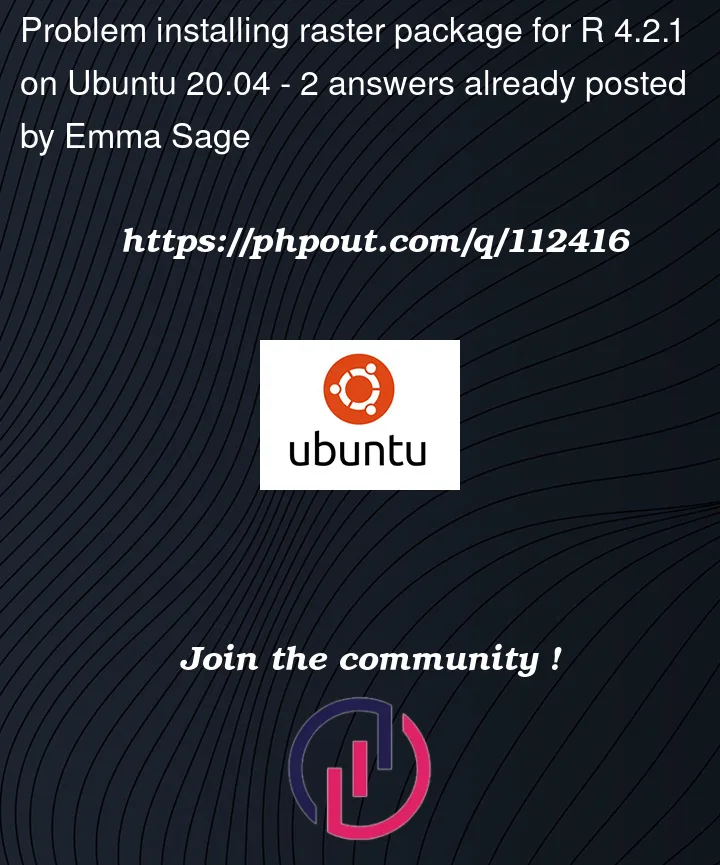I’m attempting to install the raster package to be able to run a model in RStudio – I’m using Ubuntu 20.04, and R 4.2.1. Whenever I run install.packages('raster') in the RStudio console I get this error. I’ve already installed r-cran-raster for Ubuntu, am using a PPA, and have tried downloading the raster package to manually install.
I am relatively new to R and Ubuntu, so would appreciate any suggestions for what to try!
error message from install.packages('raster'):
** R
** inst
** byte-compile and prepare package for lazy loading
in method for ‘brick’ with signature ‘x="kasc"’: no definition for class “kasc”
in method for ‘brick’ with signature ‘x="grf"’: no definition for class “grf”
in method for ‘coerce’ with signature ‘"STFDF","RasterBrick"’: no definition for class “STFDF”
in method for ‘coerce’ with signature ‘"STSDF","RasterBrick"’: no definition for class “STSDF”
in method for ‘coerce’ with signature ‘"asc","RasterLayer"’: no definition for class “asc”
in method for ‘coerce’ with signature ‘"RasterLayer","asc"’: no definition for class “asc”
in method for ‘coerce’ with signature ‘"kasc","RasterBrick"’: no definition for class “kasc”
in method for ‘coerce’ with signature ‘"kasc","RasterStack"’: no definition for class “kasc”
in method for ‘coerce’ with signature ‘"kde","RasterLayer"’: no definition for class “kde”
in method for ‘coerce’ with signature ‘"grf","RasterBrick"’: no definition for class “grf”
in method for ‘coerce’ with signature ‘"grf","RasterLayer"’: no definition for class “grf”
in method for ‘extent’ with signature ‘x="bbox"’: no definition for class “bbox”
in method for ‘extent’ with signature ‘x="sf"’: no definition for class “sf”
in method for ‘extract’ with signature ‘x="Raster",y="sf"’: no definition for class “sf”
in method for ‘mask’ with signature ‘x="Raster",mask="sf"’: no definition for class “sf”
in method for ‘raster’ with signature ‘x="sf"’: no definition for class “sf”
in method for ‘raster’ with signature ‘x="kasc"’: no definition for class “kasc”
in method for ‘raster’ with signature ‘x="asc"’: no definition for class “asc”
in method for ‘raster’ with signature ‘x="kde"’: no definition for class “kde”
in method for ‘raster’ with signature ‘x="grf"’: no definition for class “grf”
in method for ‘rasterize’ with signature ‘x="sf",y="Raster"’: no definition for class “sf”
Creating a generic function for ‘rowSums’ from package ‘base’ in package ‘raster’
Creating a generic function for ‘colSums’ from package ‘base’ in package ‘raster’
in method for ‘setValues’ with signature ‘x="RasterLayerSparse"’: no definition for class “RasterLayerSparse”
in method for ‘stack’ with signature ‘x="kasc"’: no definition for class “kasc”
munmap_chunk(): invalid pointer
Aborted (core dumped)
ERROR: lazy loading failed for package ‘raster’
* removing ‘/home/emmsage/R/x86_64-pc-linux-gnu-library/4.2/raster’
Warning in install.packages :
installation of package ‘raster’ had non-zero exit status
The downloaded source packages are in
‘/tmp/RtmpuqJnA5/downloaded_packages’




2
Answers
Package raster depends on terra, which has system requirement on external libraries.
On Ubuntu 20.04, do the following.
Install GEOS
Install GDAL
Install PROJ
Install sqlite3
Only after these, can you do
install.packages("raster")in R.The answer by @Zheyuan is very good and complete and detailed, and utilises the existing Ubuntu binaries — and appropriate PPAs — well.
But more recently, a new choice became available via the r2u setup I created. It is very similar, but offers all of CRAN as binaries for Ubuntu 20.04 and 22.04. Myself and a few other already use it quite extensively.
I recorded a quick animated gif to show it which I will post at Twitter in a reference to this answer (I cannot post gifs over 2mb here, hence the detour). I use Docker here to simulate an "empty" system with R and not much else under 20.04 "focal". The r2u has the setup steps you would need to make in a simple script you can exmine and carefully run its five steps.
Once done, you get
install.packages("raster")to give you all the binaries in one step. (In the video I also tell my computer the local address of the server. That is only needed here and not generally.)